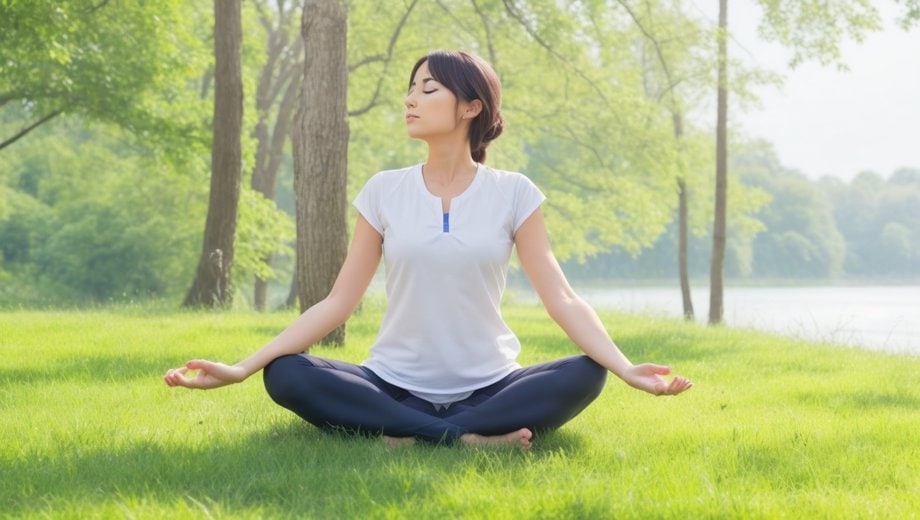Mindfulness Meditation for Anxiety Management

Are you struggling with anxiety and looking for an effective way to manage it? Look no further!
In this article, we will explore the science behind mindfulness meditation and how it can help reduce anxiety.
You will learn about the role of mindfulness in anxiety reduction and discover practical techniques to incorporate mindfulness into your daily routine.
Get ready to experience the benefits of mindfulness meditation and take control of your anxiety.
Key Takeaways
- Scientific evidence supports the effectiveness of mindfulness meditation for anxiety management.
- Mindfulness techniques activate brain regions associated with emotional regulation.
- Mindfulness-based interventions significantly reduce anxiety symptoms in individuals with generalized anxiety disorder.
- Practicing mindfulness meditation can provide relief from anxiety.
The Science Behind Mindfulness Meditation for Anxiety Management
You’ll be amazed by the scientific evidence supporting the effectiveness of mindfulness meditation for anxiety management.
Numerous studies have been conducted on mindfulness meditation research, and the results consistently show its positive impact on reducing anxiety levels.
Mindfulness techniques, such as focusing on the present moment and observing thoughts without judgment, have been found to activate regions in the brain associated with emotional regulation and increase the production of calming neurotransmitters.
One study published in the Journal of Clinical Psychology found that mindfulness-based interventions significantly reduced anxiety symptoms in individuals with generalized anxiety disorder.
Another study published in the Journal of Consulting and Clinical Psychology showed that mindfulness meditation was as effective as cognitive-behavioral therapy in reducing anxiety and preventing relapse.
These findings highlight the scientific basis for incorporating mindfulness meditation into anxiety management strategies.
Understanding the Role of Mindfulness in Anxiety Reduction
By focusing on the present moment and your breathing, you can gain a better understanding of how mindfulness practices can help reduce feelings of unease and worry. Mindfulness techniques and exercises can be valuable tools in managing anxiety.
Here are three ways mindfulness can help:
- Increased self-awareness: Mindfulness encourages you to tune into your thoughts, emotions, and physical sensations without judgment. This self-awareness allows you to recognize and acknowledge your anxious thoughts and feelings, which is the first step in addressing them.
- Improved focus and concentration: When you practice mindfulness, you train your mind to stay present and focused on the task at hand. This enhanced ability to concentrate can help you redirect your attention away from anxious thoughts and worries, promoting a sense of calm and relaxation.
- Reduced reactivity: Mindfulness teaches you to respond to anxiety-provoking situations with mindful awareness rather than reacting impulsively. By pausing, observing your thoughts and emotions, and choosing a mindful response, you can prevent anxiety from escalating and regain a sense of control over your reactions.
Incorporating mindfulness techniques and exercises into your daily routine can make a significant difference in managing anxiety and promoting overall well-being.
How to Practice Mindfulness Meditation for Anxiety Relief
When practicing mindfulness meditation for relief from anxious feelings, it’s important to start by finding a quiet and comfortable space. This allows you to fully focus on the present moment and let go of any distractions. Once you’ve created the right environment, there are some practical tips you can follow to enhance your meditation experience. One common misconception about mindfulness meditation is that you need to completely clear your mind of thoughts. In reality, it’s about observing your thoughts without judgment and gently bringing your attention back to the present moment. Another misconception is that you need to meditate for long periods of time to see benefits. Even just a few minutes of daily practice can make a difference. By incorporating mindfulness meditation into your routine, you can find relief from anxiety and cultivate a sense of calm and clarity.
| Practical Tips | Common Misconceptions |
|---|---|
| Observe thoughts | Clear mind completely |
| Bring attention back | Long meditation time |
| Daily practice | |
| Cultivate calm and clarity | |
Exploring the Benefits of Mindfulness Meditation for Managing Anxiety
To fully experience the benefits of practicing mindfulness meditation for anxiety relief, it’s important to explore how it can positively impact your overall well-being. Mindfulness meditation can provide numerous benefits for managing anxiety and improving your mental health. Here are three ways it can help:
- Reduces stress: Mindfulness meditation helps you focus on the present moment, allowing you to let go of worries and anxieties about the past or future. This can significantly reduce stress levels and promote a sense of calm.
- Enhances self-awareness: By practicing mindfulness meditation, you become more attuned to your thoughts, emotions, and physical sensations. This increased self-awareness can help you identify triggers of anxiety and develop healthier coping mechanisms.
- Improves resilience: Regular mindfulness meditation strengthens your ability to handle stressful situations. It helps you cultivate a non-judgmental attitude towards yourself and others, fostering resilience and flexibility in the face of anxiety-inducing circumstances.
Tips and Techniques for Incorporating Mindfulness Into Your Anxiety Management Routine
Incorporating mindfulness techniques into your daily routine can greatly improve your ability to manage and reduce feelings of anxiety. By taking a few moments each day to practice mindfulness, you can cultivate a sense of calm and relaxation that will help alleviate the symptoms of anxiety.
One simple way to incorporate mindfulness into your routine is to start your day with a mindful breathing exercise. Take a few deep breaths, focusing on the sensation of the breath entering and leaving your body.
Throughout the day, try to bring your attention to the present moment by practicing mindful awareness. Notice the sights, sounds, and sensations around you without judgment.
Frequently Asked Questions
Can Mindfulness Meditation Completely Eliminate Anxiety?
Mindfulness meditation can be effective in reducing anxiety, but it may not completely eliminate it. Although it has its limitations, practicing mindfulness regularly can help you manage and decrease feelings of anxiety.
How Long Does It Take for Mindfulness Meditation to Start Reducing Anxiety Symptoms?
It varies from person to person, but scientific research suggests that mindfulness meditation can start reducing anxiety symptoms within a few weeks of consistent practice. Its effectiveness may depend on individual factors.
Is Mindfulness Meditation Suitable for Everyone, Regardless of Their Anxiety Severity?
Mindfulness meditation can be effective for managing anxiety, but it may not be suitable for everyone, depending on the severity of their anxiety. There are alternative methods available for anxiety management.
Are There Any Potential Side Effects or Risks Associated With Practicing Mindfulness Meditation for Anxiety Management?
When practicing mindfulness meditation for anxiety management, it is important to be aware of potential side effects and risks. These can include increased emotional sensitivity, temporary worsening of symptoms, and difficulty dealing with traumatic memories.
Can Mindfulness Meditation Be Used as a Standalone Treatment for Anxiety, or Should It Be Used in Conjunction With Other Therapeutic Approaches?
Mindfulness meditation can be effective as a standalone treatment for anxiety, but it is also beneficial when integrated into traditional anxiety treatment programs. It’s worth considering both approaches for optimal results.








